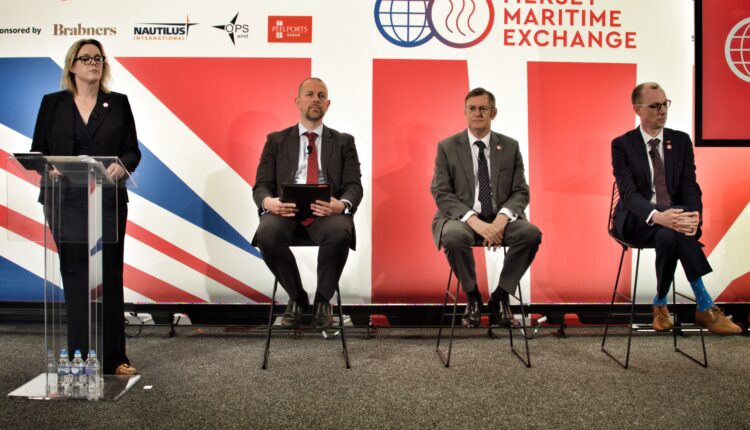
Merseyside takes lead in shaping future of £46bn maritime sector
Senior figures in the UK’s £46bn maritime sector joined Government ministers for a major industry summit at Mersey Maritime in Birkenhead. Tony McDonough reports
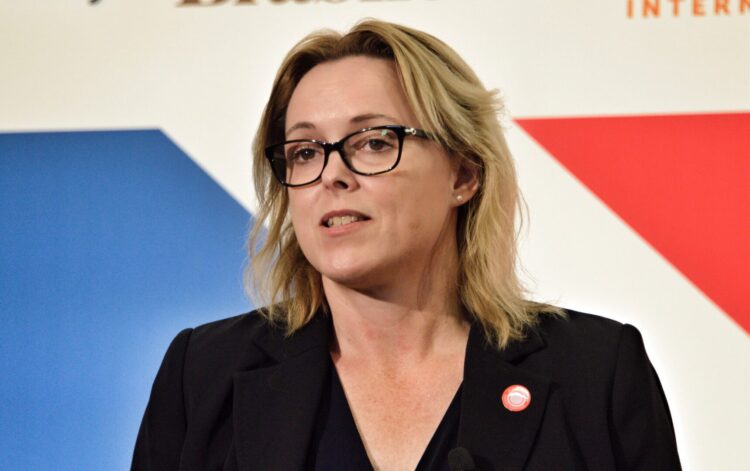
Leading figures in the UK’s powerhouse £46bn maritime sector gathered in Birkenhead for the third annual Maritime Exchange conference.
Held at the headquarters of Mersey Maritime and broadcast live to an online audience, the Maritime Exchange, Maritime 2050: Where are we now? was organised by Mersey Maritime in partnership with the Department for Transport and Maritime UK. It debated the progress of the UK’s Government’s Maritime 2050 report.
The conference was sponsored by Brabners, Nautilus International, OPS Wind, and Peel Ports Group. And it was supported by Wirral Council.
There was also a strong ministerial presence at the event. Maritime Minister Robert Courts was present and offered a keynote address. He was joined via video link by Innovation Minister Amanda Solloway and Minister for International Trade, Graham Stuart. Former Maritime Minister, Nusrat Ghani, one of the authors of Maritime 2050, also spoke.
Following initial introductions from the Princess Royal via video link as well as Mersey Maritime chief executive Chris Shirling-Rooke and Robert Courts, there was a series of discussion panels featuring entrepreneurs and industry experts and leaders.
Innovation
Sarah Kenny, chair of Maritime UK, chaired the innovation panel which included Tom Chant, chief executive of the Society of Maritime Industries, Jonathan Taylor, vice president at Marine of Expleo, and Kevin Smith, Founder of Maritime Digital Hub.
Tom said it was vital UK businesses were able to secure funding to stay ahead in terms of new technology and innovation. He explained: “International competitors are getting more funding and we have to get ahead of that. We don’t just want to be suppliers of parts.
“Other industries such as automotive have a longer history of working together and we need to be more collaborative. We need funding so we can get commercial prototypes into action.”
Bringing in the best minds and innovators from outside the sector was also important, said Jonathan, adding: “We have to inspire people to think differently. Better productivity could lead directly to the bottom line and that will free up more funding.
“Over the past year, due to the pandemic we have seen 10 years of activity in other sectors compressed into one year. How do we do that in maritime? We need to look at other industries. Things are happening at an advanced pace in automotive and aerospace.”
Kevin said innovation in maritime could be helped by bringing in people from other areas of digital, such as gaming. He explained: “We have to create a sharing and open knowledge mindset. That is how we move forward strategically together.
“In maritime we need to have more data points and make them freely available. If we start sharing knowledge with each other then we can see change happen very quickly.”
Tom agreed that more collaboration was the key to securing more Government funding and support, adding: “We will only get funding if we talk with one voice.”
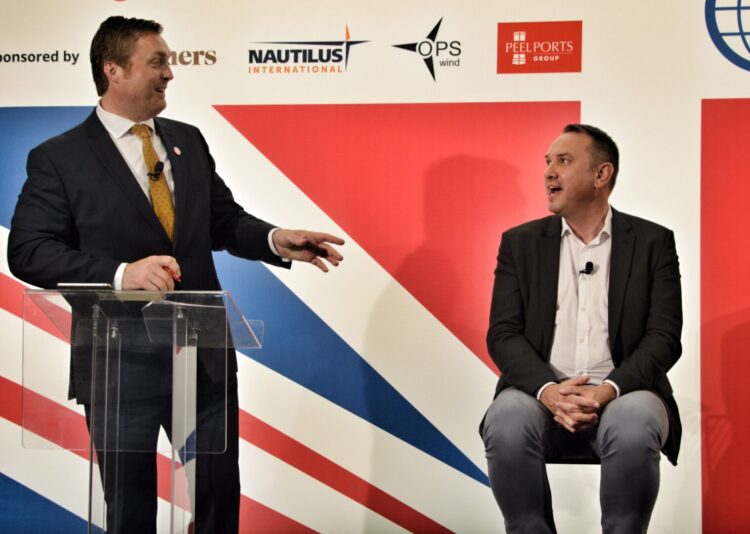
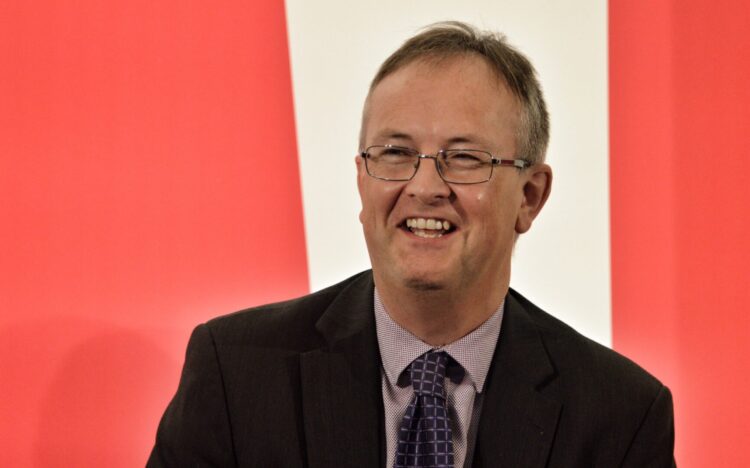
Environment
On the environment panel was Peter Aylott of the UK Chamber of Shipping, Che Murphy from Offshore Paint Services (OPS, Vice-Admiral Chris Gardner of the Royal Navy and former maritime minister, Nus Ghani.
Peter said ship owners were willing to change and switch their vessels to more sustainable sources of propulsion but added there would need to be a significant investment in new infrastructure.
“Ship owners are prepared to invest but the certainty has to be there,” he said. “Do we use transitional fuels or do we go directly to technologies such as hydrogen. We need to talk to Government very closely.”
Later this year the Government is to publish a new shipbuilding strategy and Chris was keen to dispel the myth that military technology and the environment were not compatible.
He explained: “What has struck me most is the need to expand our horizons outside the usual bandwidth of traditional defence suppliers. The challenge is how do we bring innovative thinking into the design and build of new vessels. We need to be a greener maritime nation and the Royal Navy has to play its part in that.”
Nus said it was positive that the UK has taken the lead ahead of many countries around the world by producing a clean maritime plan as a result of Maritime 2050. Che said he wanted to see support for smaller companies in the Liverpool city region ahead of the Government announcing the next generation of offshore wind farms.
OPS sends technicians all over Europe to repair and maintain offshore wind turbines and also runs an industry-leading training centre. Che said: “We need to create a bigger training facility if we are going to keep up with demand.”
Regional Growth
Chris Shirling-Rooke chaired the regional growth panel which included Richard Ballantyne, chief executive of the British Ports Association (BPA), Stephen Carr, group commercial director of Peel Ports Group and Vicky Victoria Race of The Department for Transport.
Richard said two of the biggest issues in terms of regional growth were transport connectivity and planning rules around ports. He added: “It is the ‘last mile’ links that matter. Around 75% of freight is moved by road and we need to invest in more rail so we can move freight in a carbon-friendly way.”
Stephen also said it was smaller investments into transport ‘pinch points’ that mattered more than the bigger infrastructure investments. He explained: “As ports we are in the middle of the freight journey.
“We can drive investment and employment but it is no good if we can’t move freight around. It is currently faster to move things by rail from north to south than it is from east to west and that is where we need more support.”
Vicky agreed, adding: “This is about getting industry and Government to work closer together. The ‘last mile’ has been an issue in the transport sector for the past 20 years.”
Earlier this year the Government announced that the Liverpool city region would be one of the new generation of UK Freeports. It will cover multiple locations in the region but critics say it is just a way of helping companies avoid tax.
However, Stephen said this was a very narrow way to view Freeports and said he believed the benefits were much wider. He said: “People are aware that we have developed Liverpool2 at the Port of Liverpool but we have also talked about the wider concept of a ‘superport’.
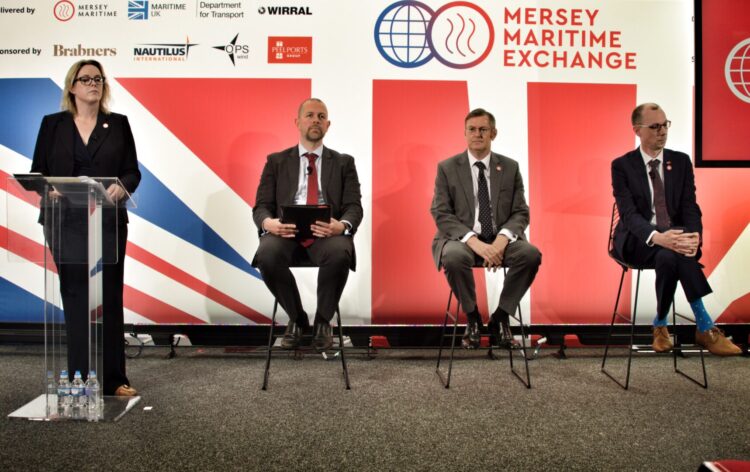
“Freeports bring that superport idea to life. It is just about the advantages around tax and customs but it is also about crystallising and energising that cluster effect. That starts to take over and you start to create specialisms and then your economy really starts to motor.
“Ports such as Liverpool can incentivise investment into an area. We have invested half a billion pounds into Seaforth. We have seen how that brings in other investors. Investment follows investment and growth follows growth.”
Competitiveness
Sarah Kenny returned for the chair for this final panel which comprised Minister for International Trade, Graham Stuart, Roy Barry, partner and head of manufacturing and supply chain sector at law firm Brabners and Clive Hickman, chief executive of the Manufacturing Technology Centre (MTC).
Speaking by video link the minister said the last 18 months had taught the UK about the importance of building up resilience. He said the new Free Trade Agreement (FTA) with Australia was good news and that it was “just the beginning”. He added: “We will be signing more agreements and we will secure access to the biggest export markets.”
Roy said we need to be ready to “look west” ahead of a likely FTA with the US. He said Freeports were a well known concept in the US and this was good news in terms of the UK’s trading relationship with North America. He added: “FTAs are fundamental to our future as a trading nation.”
Training is a critical issue when it comes to competitiveness according to Clive. He explained: “Too often we are training people just to use the technology of today but we also need to give young people the skills they will need in advanced manufacturing in the future.
“When we introduce advanced manufacturing into a company we make sure they introduce an upskilling programme for existing staff. We can retrain people to do jobs of higher value. In the 10 years of the MTC introducing new technology into companies that has never led to the loss of a single employee.”
Clive also returned to a theme brought up in one of the earlier sessions about the need for great collaboration within the maritime sector. He said: It is a classic British trait to always think your main competitor is next door and not on the other side of the world.
“Other sectors, such as aerospace, have demonstrated that by working together you can leverage more investment. Maritime needs to get that flywheel moving. It is collaboration that will make us great.”
